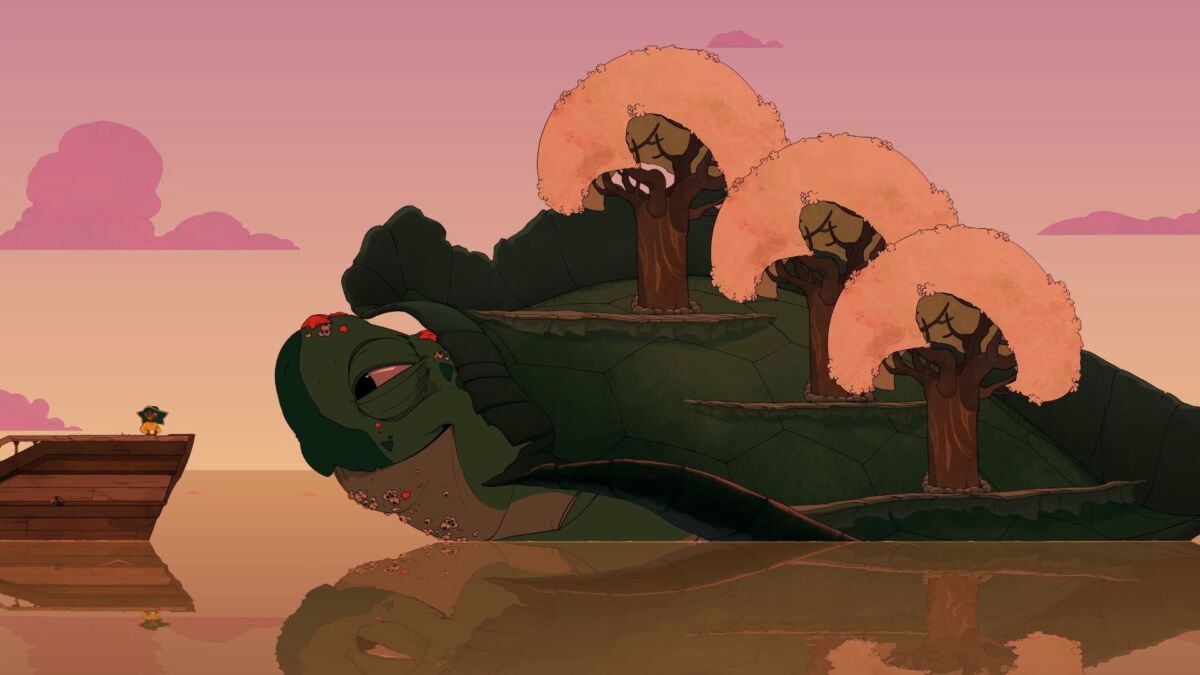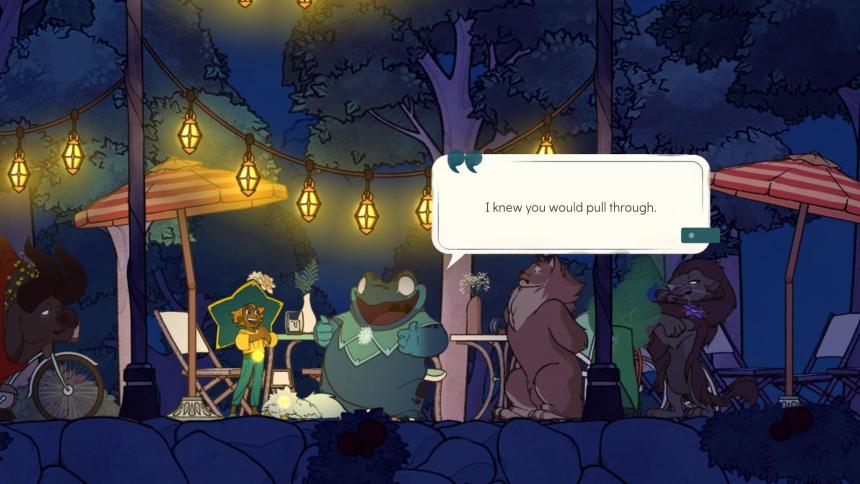Welcome to YOU DIED, a new column where I dive into depictions and discussions of death in video games. We’ll dig into what death means, how this meaning is conveyed, and what this means for the game or for the players. To start us off, let’s look at the compassionate, death positive farming sim of Thunder Lotus Games’ 2020 crafting sim about human life, Spiritfarer.
CONTENT WARNING: This article contains discussions of death, dementia, aging, and grief, as well as heavy spoilers for Spiritfarer.
Spiritfarer doesn’t have the usual video game representation of death. You don’t “die” when you take a bullet or fall off a cliff or anything like in more action-oriented games. Instead, your character Stella is a spirit, who ferries souls through the afterlife to the great beyond. Death is technically all around you then, since everyone you encounter is a spirit taking their sweet time making their peace with their ultimate end.
It turns out that the journey from life into death isn’t exactly a straightforward voyage. As the new Spiritfarer, you can’t take your guests to the Everdoor (which leads to the true Great Beyond, whatever it may be), until they’re ready. In the meantime, and it’s not like anyone has much of a schedule once they’ve passed on, your job as captain of this ship of souls is to make your guests as comfortable as possible and help them resolve whatever feelings are still keeping them tethered to their old lives.

Your main gameplay actions in Spiritfarer are very hands-on. You grow and harvest crops, weave fabric, cook food, and build houses for your dearly-departed guests. Each passenger has their own line of quests to give you as they slowly open up about their pasts, buttered up by all the food and knick-knacks you throw their way.
For a game about concepts of death and the nature of spirits, Spiritfarer’s crafting based mechanics might seem an odd fit. But the grind and tedium of endlessly hammering things together are kind of the point — just like in real life, you spin your wheels, balancing all the repetitive aspects of life, sometimes invested, sometimes going through the motions, and then, often out of nowhere, a life ends.
Whenever a passenger tells you they’re ready to go to the Everdoor, the gravity of the game’s design really sinks in. Your job as Spiritfarer is more than just faring spirits — you’re a caretaker. All the maintenance you’ve been doing was so these people (or, y’know, snakes and deer and frogs) could have the peace of mind to finally let go. And even though you might hate to say goodbye to your favorite passenger, you still have to, because that’s your job — both as Stella the Spiritfarer, and the player of the game.

Spiritfarer is a game that has a kind heart. I don’t mean that in a naive or cutesy way. It doesn’t coddle the player or pretend everything in the world is perfect. Multiple passengers mention fighting in war, and a pair of your passengers are violent mobsters. You help negotiate workers’ rights for a union early on, as even in the afterlife some people have brought the baggage of capitalism along. Spiritfarer is kind because it builds its entire conceit around caregiving, about giving people room and space to reflect on their lives and choose when and where to go next.
The spirits who benefit from this relaxed freedom are the ones to tell you when they’re ready to move on. They make the decisions at their own pace, having finally concluded whatever business was left for them that they couldn’t shake. They also get to make a choice that very few get to make in life, as death tends to come unannounced and unpredictable. When people in the real world die, they tend to leave plenty of work unfinished, but Spiritfarer lets them make up for lost time and cross off their to-do lists.
You the player also have the luxury of time. Characters can’t get to the Everdoor without you taking them there, so even when someone says they’re ready to leave, you don’t have to let them go until you’re ready. I definitely held on to a passenger or two until I’d at least discovered their favorite food, because I thought they deserved to eat something they loved at least one more time.

There’s one passenger, a hedgehog named Alice, who’s an extremely kind old soul. She helps you cook and teaches you how to harvest thread from nebula pillbugs, one of the many other creatures found in the game’s metaphysical ocean. Alice is also still dealing with the dementia she struggled with while alive, and will often mistake you for other people from her life. Spiritfarer makes an interesting distinction between the mind and body here, as the mind seems to stick with the soul even after the body has stopped living. Saying goodbye to Alice and escorting her to the Everdoor was an early experience in how Spiritfarer gives every passenger a unique take on death and dying. Alice lived a long life, and the world no longer made sense to her, so I didn’t make her stick around long. She deserved the rest.
Then there’s Giovanni. A lion with a serial philandering problem, Giovanni is likely the first passenger you’ll meet that you just straight up do not like. He does give you expensive gifts, but he’s also condescending, overdramatic, and unapologetic about his behavior, even when you call him out on it. And yet, it also turns out that he was a vet in WWII, and fought to defeat fascism. When his time to leave the ship finally came, I won’t say I was sad, but I was conflicted. In Giovanni, Spiritfarer shows how death does not absolve people of what they did in life. His dying doesn’t cancel out how he cheated on his wife. But people do leave complicated legacies, and their no longer being around doesn’t make unpacking their effect on us any easier.

The last passenger I want to analyze is Atul, a gregarious blue frog who was also Stella’s uncle in life. Atul loves to hammer away in his workshop, and he eats just about any food you throw at him with gusto and gratitude. He’s charming and friendly to everyone and always a bright presence on your boat, even as he asks you to cook him some fried chicken, a dish that requires an ingredient you won’t have access to for literal hours after he makes the request. Due to the more long-range nature of his requests, Atul is likely to be one your ship for longer than most spirits. This only makes it even more devastating when, after hosting a feast with you and the other passengers, Atul just suddenly disappears.
You don’t get to take him to the Everdoor, and you don’t get to have a final conversation with him on the way or decide when you want to finally let him go. Uncle Atul leaves without saying goodbye, and you just have to keep steering the ship. The meaning here is obvious — most deaths in our lives are sudden, unexpected, and unannounced. They leave us feeling cheated, or like we missed something, and above all they leave us with a feeling of unfairness. In a game all about our relationship with the concept of death in all its forms, Atul’s exit stands out, making its point with unmissable force.
Spiritfarer is kind, but it’s not easy. The game’s ending ties all of these elements together: the concept of having time to meet death on one’s own terms, the presence of others and how they’ll remember us when we’re gone, and the sheer amount of crap, both emotional and tangible, we leave behind when we go. This crafting sim demonstrates in its every story beat that there is no single way to approach death, even if we all do have to take the journey eventually.
READ MORE: Skyrim & Grief: The Distraction of Adventure
Some of the coverage you find on Cultured Vultures contains affiliate links, which provide us with small commissions based on purchases made from visiting our site.


